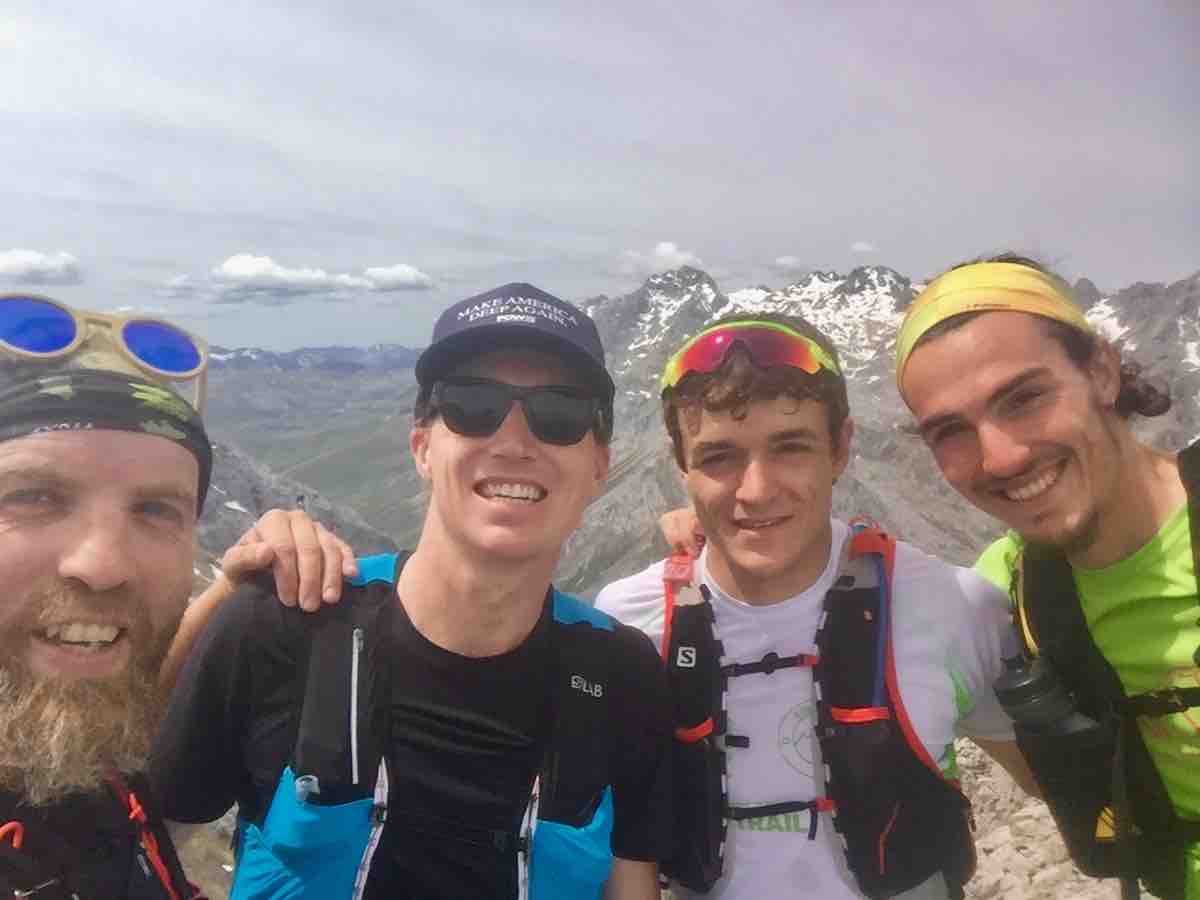Spanish people love me. Well, at least Spanish runners do. I won a race there five years ago and despite doing very little of note since then, I can’t go to a race there without being mobbed by people wanting to take photos with me. It’s very uncomfortable, but yeah, a little fun too, and I like that it gives me an easy way to meet people in what is still a very foreign country for me. Still, I don’t feel that I merit such adulation in any way whatsoever, and I noticed that because my values are different from many Spanish runners (I don’t generally idolize runners, but they do) it’s easy to accidentally patronize them. Like, sometimes I think it’s almost cute that they think fast runners are so important, but the second I realized that I was thinking this way I was horrified. Telling someone they are wrong for thinking something is important is a dangerous road to go down. I needed to try to see things their way.
For example, last weekend I had a taste of the other side of a very European trait that we sometimes scoff at in the U.S. I was at a race in the north of Spain with my friend Depa, who is kind of like the hub of the wheel that is the Spanish trail running scene. He owns several running stores, publishes a magazine called Trail Run, and works as a speaker and organizer at lots of races. I had a strained hamstring, and told him I shouldn’t run the race for fear of making it worse. He agreed, but said I should start the race anyway and then drop out one kilometer down the road. “It is good for the publicity,” he said with his heavy Spanish accent, “and the people want to run with you.”
I was actually shocked at first. I hate dropping out of races. But I thought about what he said and decided he was right. Since Spanish runners seem to think I’m important, maybe I could help out the race by starting. But there was more to it than simply being in some photos. I think the idea is that by starting the race I would give the impression that I’m trying, that even if I’m injured I want to race so badly that I’ll at least give it a shot. Theoretically, this imparts a diehard passion for the sport and a kind of good-natured conviviality. It gives people a real connection with the runners they see in magazines.
Dropping out of a race is not nearly as big of a deal in Europe as it is in the U.S. In a general sense, I think this is rooted in the different ways that people on both continents view their mountains and wild places. Americans are scandalized when ‘elites’ drop out of races. It’s as if they are betraying, by dropping out, a profound code of conduct, like they’re disrespecting the race and the mountains themselves. At least in part, this must be related to the clear distinction we draw between wild places and human places. We have an idea that mountains are separate from cities and that there are different ways to conduct yourself in each. That’s why it’s such a profound mindset shift to actually run in wild places: because running implies being in a hurry, and hurry implies competition, and competition runs counter to many of the values that represent the commonly held ideal of wilderness. For an example of a more traditional attitude in opposition to mountain running, check out this 2015 editorial in High Country News about how running in the Grand Canyon is ruining everything important about wild places. That may be a little overblown, but at heart, I think people feel that if you’re going to run in wild places, you need to respect them enough to at least finish the race.
Europeans, however, seem to regard their mountain trails as extensions of their roads; they don’t draw such a distinct line between civilized and wild as we do. I expect this is rooted in transhumance and their multi-thousand-year recorded history. They’ve been moving between valleys and mountains, towns and pastures for so long that they consider the whole in a different way. In fact, they consider it as a whole, as a single entity rather than a juxtaposed collection of many. They certainly parcel out varying forms of national parks, but in many cases these include ancient villages and the people whose ancestors have lived there for generations. The human history is very different in Europe than in America, and this has a tremendous effect on how they see the land. To take one example, mountaintop roads and precipitous gondolas are much more common in the Alps than in Colorado. Obviously there’s Pikes Peak, but people had to build the infrastructure on that mountain from bottom to top in a single go, whereas many Alpine lifts are simply connecting one ancient village with another over the course of an old road. The infrastructure was already in place; they didn’t have to blaze a new path. In terms of running, it’s not as big of a mental step for them to start competing in the places they already live, and dropping out doesn’t seem like such a failure because it’s just a part of racing.
Attitudes in the U.S. are different. We have a more-or-less unspoken ‘death before DNF’ code that I think is based in our concept of wilderness: if you get yourself in, you gotta’ get yourself out. America, according to literary criticism, has always been defined by its ‘frontier,’ which is a black and white idealogical line between ‘civilized’ and ‘savage.’ In a literary sense, going into the mountains for us represents an engagement with a more pure world, a land of discipline and character and values, where you are expected to respect the landscapes you pass through both physically and almost spiritually too. Indeed, there’s even a certain implied sacredness in much literature about the wild places of the American West, like in the works of Terry Tempest Williams. Dropping out of races that are held in wild places implies a kind of superficiality that runs counter to the ideals of wilderness.
Obviously this is totally generalized and now outdated within the sport of mountain running, but I’ve always been super influenced by the concept of what wilderness represents for people and the world. To a large degree, my purpose in becoming a mountain runner was to personally engage with the ideas I learned about from people like Edward Abbey and Wallace Stegner, people who spent their whole lives trying to put the value of wild places into words that made sense to everyone. Competition has always been secondary for me, simply a fun way to challenge myself with my friends in beautiful places. My attitude aligned perfectly with the old style of ultrarunning where the ‘elites’ were just a bunch of people who liked to run and explore in the mountains so much that they accidentally got super fit and fast.
But this philosophical bent has hindered my ability to be competitive in past years. As I’ve grown up and had different experiences, my attitudes toward what I do in the mountains and why I do it have often run counter to each other. I have struggled to reconcile my romantic concepts of idyllic nature and strict adherence to values with the realities of life and competition. Running fast in wild places has sometimes seemed contrary to my thoughts about what wild places are supposed to be for. In trying to figure this out, my success has faltered. I have let nearly five years pass since being truly competitive. In the meantime, the sport’s momentum has grown unchecked. New runners have taken up mountain running by the thousands, and the ‘elites’ are becoming a lot more like the elites in other sports–people who ‘train’ and get massages and take themselves seriously. Despite my half-assed attempts to lead the way in this regard by incorporating intervals into my routine, I am at heart still part of the old school, still part of the bearded (well, in spirit) hippie contingent much more dedicated to the mountain part of ‘mountain running’ than the running part.
But as long as you don’t harm the landscape or the creatures that live in it, nobody should be able to tell you how to enjoy yourself in wild places. Racing is as valid as meditating, and dropping out of races is an inevitable part of racing. I want to continue running in the mountains, and it’s as intolerant to tell people how they are supposed to enjoy the mountains as it is to tell people what they are supposed to find important. In fact, they are the same thing. In terms of my recent ‘races’ in Spain, it still feels like a bit of a blasphemy to start something with no intention of finishing, but for maybe the first time I’m able to see the Euro perspective a little better. For them, it’s most important to be part of the sport and its community. And there is reason to believe that if people enjoy recreating in the mountains, they’ll want to protect them from harm. Ultimately, that’s what it all comes down to: I love to play in the mountains with my friends and I want to be able to do so for my whole life and give the same gift to the people who come after me. There are a lot of ways to do that. Dropping out is not always giving up.
Call for Comments (from Meghan)
- What do you think are the origins of the ‘death before DNF’ philosophy that many trail and ultrarunners possess?
- Have you felt or seen positive effects of your own trail running and racing on the places and people through which you run?
- And how about negative effects? Have you recognized negative impacts of own running?

